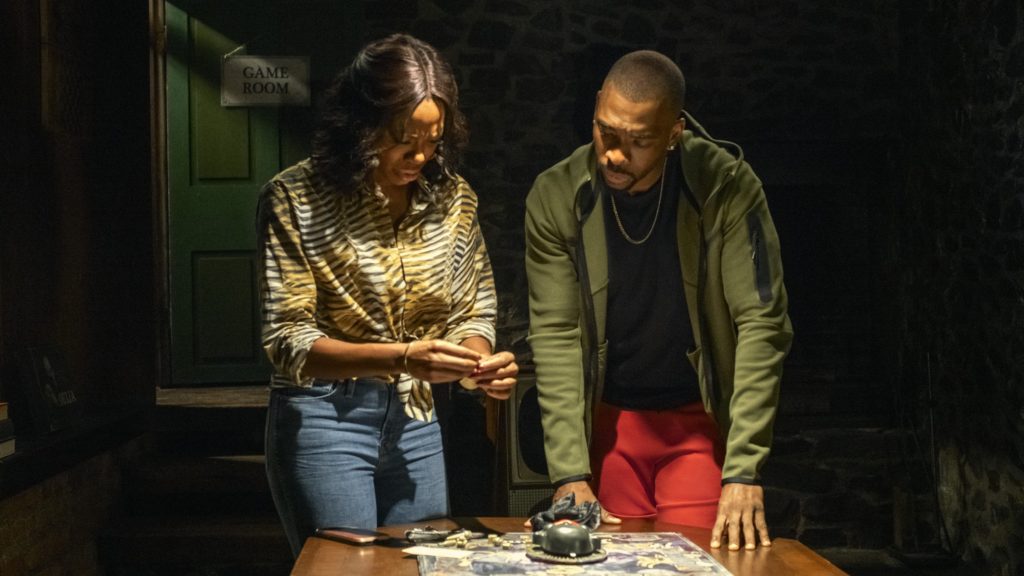Pot calling the kettle
I am not the ideal audience for The Blackening. To put it bluntly, I am not Black. This is a film that translates elements of the American Black experience into a comedic slasher. It is very much about racism, but not in the same way as Get Out, which turns casual racism into a horror scenario with the purpose of making the audience feel that violence and terror viscerally. That’s something you can experience and empathize with even if you are not Black; hell, Get Out might be more effective if you are white and not used to feeling racism.
The Blackening works differently than that. It has a lot of “you’ll only understand this if you are Black”-type humor. The characters spend a lot of time talking about their visions of their own Blackness and how that relates to the others’ Black identities. They debate, for example: Are you “less Black” if you marry someone white? If you voted for Trump? If you don’t like playing spades? And is it inherently racist to even make those claims about someone else’s Blackness relative to your own?

These are (to varying degrees) interesting questions, but not exactly aimed at me. That’s fine, and it’s healthy for audiences to engage with films that present worldviews different from their own, but it also means the film doesn’t quite work on me the way it wants to. I’m too much at a distance.
So, I’m not the ideal audience… but, on the other hand, I also am the ideal audience in most other ways. I like slashers, including and especially PG-13 novelty-slashers; I think that Happy Death Day is one of the best movies of 2017 (incidentally, I like it more than Get Out of the same year). I give a wide latitude to a horror-comedy movie so long as it’s splashing in one of those two ponds pretty well.
And The Blackening just isn’t that good. Three or four punchlines made me laugh — the exasperated group response to “we should split up” in particular is terrific. But the movie isn’t remotely scary or tense except for a couple of moments. Compare that to Scream which is just a deliciously thrilling movie at its core, its horror bonafides established in the brutal opening scene. The Blackening has its own standalone intro in a similar vein, but director Tim Story fails to convey any suspense or dread to tease us into the rest of the film.
The story is a run-of-the-mill cabin in the woods survival plot: A group of college friends reunite for a weekend, only for its various characters to be hunted down by a wacko in a mask with a crossbow. The added wrinkle here is that the group plays a cursed, racist board game that seems to be controlled by the mysterious villain.

The acting is inconsistent: Dewayne Perkins is very funny and charismatic as Dwayne, the high-strung gay friend in the group. I’d love to see him in some more movies. (Perkins also has a writing credit.) On the opposite end of the spectrum, Jermaine Fowler is a trainwreck as Clifton, playing the character like this is a sketch from Scary Movie; it’s a mugging, exaggerated caricature.
I think the underlying problem is that the movie doesn’t ever get around to making us care about the characters due to the tonal whiplash of its components; nor is it fun or tense enough as a thriller to be a pure piece of horror-craft. Thus none of the conflicts or ideas really pop off the screen, instead transporting us from one scenario to the next and hoping something within sticks. It rarely does.
So the sum of it all is a couple funny gags, a couple decent slasher scenes, a couple nice performances, and not much else. Whether or not you’re the target demographic, that’s not much of a movie.
Is It Good?
Not Very Good (3/8)
Dan is the founder and head critic of The Goods. Follow Dan on Letterboxd. Join the Discord for updates and discussion.


4 replies on “The Blackening (2022)”
It’s always weird to be reminded that spades is more niche and, apparently, more raced than I thought it was when I was a teenager and pretty much every single person in my South Carolina town played spades. I don’t know how it receded from popularity, it got huge during WW2 as a simpler alternative to bridge, so you’d think it would be pretty much a homogenously national thing.
I’ve played quite a bit of spades, too, but our card game of choice in high school was capitalism. Part of the fun was that no two groups had the same set of rules so you’d get wildly different experiences (do you need just one 2 to trump a trick? or does it have to be the same number? etc.). I do enjoy spades but I’m not sure I’ve played since I learned bridge, and honestly have barely played any card games with a classic deck of cards since I got into board games as a hobby.
Hi-diddle-hi-de-die Murderinos!
Since I’m neither a fan of the Slasher genre nor a Black American the film might well have done less for me than it did for you (I found the jokes about various degrees of Blackness and Black Vs White genuinely disquieting).
On the other hand I accept that not every film has to be For Me and I’m perfectly happy to leave this one to those who have a better chance of loving it.
Also, I’m always happy to see Mr Dietrich Bader show up in things, vocally or onscreen.
A movie I forgot I reviewed! Not sure what pulled you to watch it given the parameters you mentioned, but you never know when something will surprise you — too bad this one didn’t!